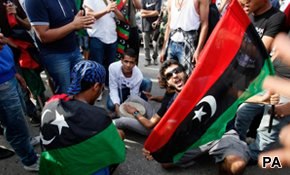The majority of the British public think the death of former Libyan dictator Colonel Gaddafi will ‘generally make things better’ in the African state over the next few months, our poll has shown, while far fewer say that it will ‘generally make things worse’ and under one in five think that it will ‘make no difference’.
- 56% of Brits think that the recent death of Colonel Gaddafi will make the situation in Libya generally better
- Just 13% say Gaddafi’s death will make the situation in Libya worse
- 17% say his death will make the situation in Libya neither better nor worse (and 14% say they do not know)
Gaddafi’s final hours
The results come in light of last Thursday’s news that the 69-year-old fugitive Colonel Gaddafi had been killed, with grainy images of his bloody body controversially broadcast around the world, finally ending his 42-year-long rule. The corpses of both him and one of his sons were reportedly buried in a ‘secret’ Libyan location earlier today, but the exact circumstances surrounding his death still remain unclear.
The United Nations has called for a full investigation into Gaddafi’s death, with the Human Rights office having voiced concerns that he may have been ‘executed’. The killing has raised questions about the stability of the National Transitional Council and the rebels’ respect for human rights laws.
‘The wounds of the past’
Meanwhile, the chief of the Arab League reportedly told Egyptian state news agency MENA that he was concerned about whether Libya will manage to ‘overcome the wounds of the past and look towards the future away from sentiments of hatred and revenge’.
But amid reports that factions in the hitherto united Libyan rebel forces are beginning to break out, the Libyans and the Western allies who backed the revolt have otherwise indicated their impatience to begin what the United States has called ‘new era’ in democracy, after nine months of sustained conflict.









